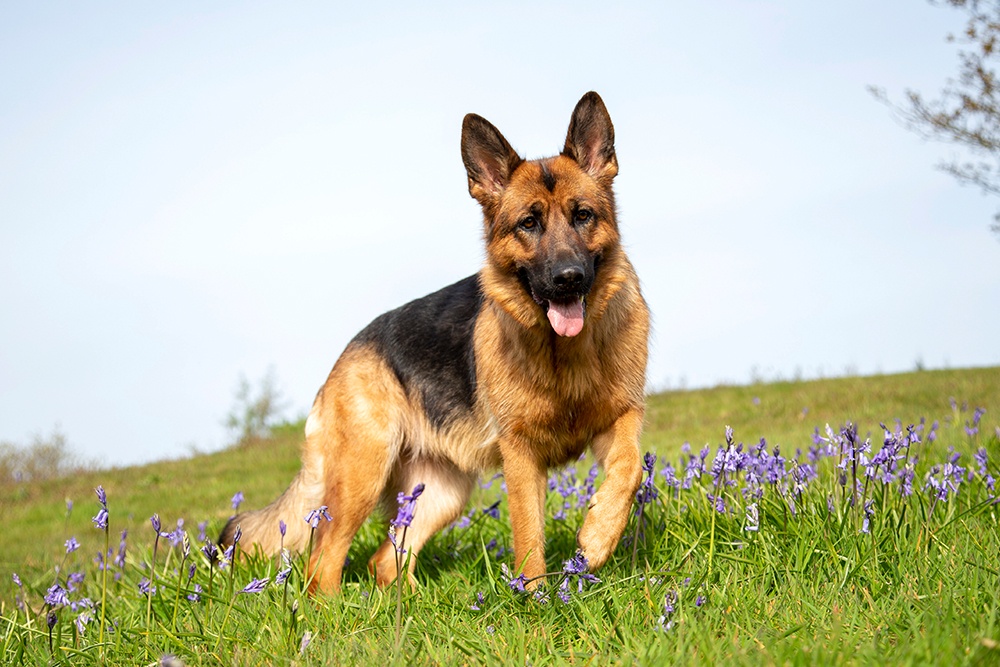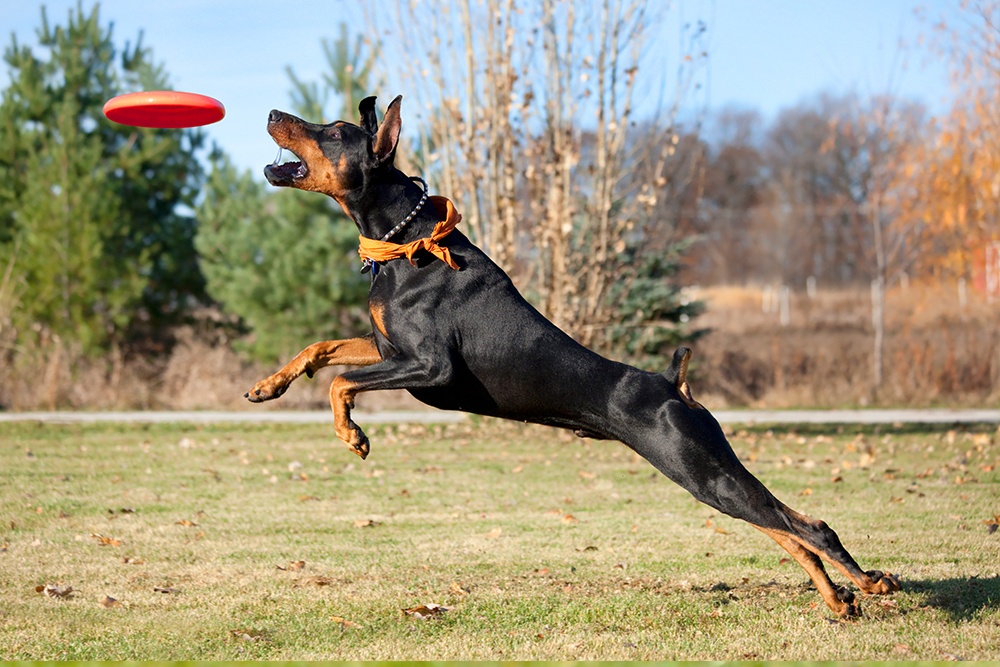Learn : Health & Wellness
German Shepherds with Skin Allergies
The versatile German Shepherd is one of the most popular and recognizable dog breeds. Eye-catching and impressive, this breed is smart and capable with an unmatched penchant for courage and loyalty. The German Shepherd has a wide range of capabilities, including military and police service, guide and therapy work, search and rescue, herding, drug detection, and competitive show and obedience. Despite the German Shepherd’s incredible aptitude and quality companionship, the breed is prone to allergies that often manifest in uncomfortable and painful skin conditions. Genetic, environmental, and food-related allergies can put a damper on your German Shepherd’s quality of life.
Type of Coat
The German Shepherd’s coat is a medium-length double coat, as this breed was initially bred to herd flocks of sheep in cold, windy, harsh climates. The dense outer coat protects the dog from snow, rain, and dirt. While the breed’s fur typically lies straight against the body, it can sometimes be wavy or wiry. Coat colors and patterns vary widely; a German Shepherd can be solid black or black combined with cream, tan, silver, red, gray, blue, white, and sable. The breed sheds year-round with at least two times seasonally where it “blows” its coat and sheds heavily all at once. Brush your German Shepherd out at least twice a week to remove as much loose and dead hair as possible to cut down on the shedding around your house.
Susceptibility to Skin Allergies
Unfortunately, the German Shepherd is a high-risk breed for skin allergies like canine atopic dermatitis (CAD). Environmental causes, mainly parasitic, and food hypersensitivity are predispositions that any German Shepherd pet parent should expect to encounter. German Shepherds are susceptible to immunological disorders, and often, this breed of dog will suffer from dry, flaky skin, sores from flea allergy dermatitis, secondary bacterial skin infections, scabies, and other forms of contact dermatitis.
Due to the high likelihood of your German Shepherd developing allergies, if you see him excessively or frequently shaking his head, or scratching, chewing, or biting on parts of his body, he probably has an allergy.
Allergy Locations on the German Shepherd
Allergies that manifest externally can occur anywhere on a German Shepherd’s body. Frequent locations for allergic inflammations in this breed are the face, ears, paws, sides, hind end, legs, and stomach. Dandruff, flaky skin, dry skin, hot spots, hair loss in patches, and sores are symptoms of skin allergies that can be found in any of the previously mentioned areas of the dog’s body.
Allergies that affect the eyes and ears must be monitored and addressed with care. These are common allergy locations, so look out for irritated, red, teary eyes and ears that are itchy, smelly, and red. The ears, in particular, can lead to painful secondary infections if the allergies are not resolved.
The Connection Between Skin and Food Allergies
German Shepherds are at a high risk of developing food hypersensitivity, and if your dog does develop a food allergy, the skin is often where chronic inflammations appear. A cutaneous adverse food reaction (CAFR) can be responsible for a multitude of skin issues. If those skin disorders are also accompanied by excessive scratching, itching, or biting, or if your dog rubs his face frequently, a food allergy may be the reason why. Chronic allergic reactions and self-trauma can lead to secondary bacterial or yeast infections accompanied by crusting, seborrhea, or alopecia.
Often the source of food allergies in canines is an animal protein like beef or chicken. Sometimes dogs develop food intolerances to other food sources such as milk, corn, and eggs. Your German Shepherd reactions to a food allergy may not be limited to his skin; he may also develop gastrointestinal issues that can make life doubly uncomfortable.
Treatment Options
A variety of over-the-counter treatments are available to provide some temporary relief if your itchy German Shepherd suffers from environmental allergies. Hypoallergenic, sulfate-free, organic shampoos can go a long way toward making your dog feel better. Shampoos that include additional anti-inflammatory products like tree tea oil or aloe vera will add to the soothing, calming effect on your German Shepherd’s skin. There are many types of topical creams and organic hot sprays that are useful, inexpensive tools to add to your fight against your dog’s allergies. Your veterinarian can prescribe antihistamines and corticosteroids to use in addition to these remedies.
If fleas or ticks are the culprits of your dog’s suffering, speak with your veterinarian about the best treatment program to rid your dog of these pets for good.
Skin allergies that are caused by a food allergy can be complicated in terms of diagnosis and treatment. First, consult with your veterinarian and perhaps an allergist or board-certified veterinary nutritionist for assistance in identifying whether a particular food is causing your dog to react this way. The veterinarian or nutritionist can help you devise a single-ingredient diet to determine if food allergies are to blame. Fresh dog food diets are an excellent way to diagnose food allergies. Here are some steps to follow to try an elimination diet with your German Shepherd:
- For eight weeks, feed your German Shepherd a new food that is limited or single-ingredient in makeup. A single-ingredient food will provide the best results.
- Be sure that the food you give to your dog during this period is one containing only single sources of animal protein, vegetable protein, and carbohydrate calories. Some examples to consider are rabbit and peas or fish and potato. Avoid feeding your dog food that includes natural flavors or unidentified proteins as they can skew the test results.
- During the elimination trial, avoid feeding your dog any table food, treats, flavored medications, or supplements as they can impact the elimination diet outcome.
- After eight weeks, slowly switch your German Shepherd back to his regular food, then observe him for allergic reactions.
Another inexpensive way to boost your dog’s digestive and immune systems is to add probiotics to your dog’s diet. Probiotics are an affordable means by which to reduce your dog’s inflammatory responses to allergens; in some cases, they can help eliminate the food allergies. Studies show that probiotics are an effective means to reduce inflammation and strengthen your dog against immunological attacks.
Keys to Fighting Food-Based Allergies
Giving your German Shepherd a fresh food diet is the best way to combat food allergies that cause skin allergies. Commercial dry kibble and wet foods typically don’t have the same levels of nutrition found in fresh food; because of the heating methods used in the cooking process, commercial foods often lose the essential nutrition that your dog needs to be healthy and allergy-free. Fresh food diets contain essential fatty acids (Omega-6 and Omega-3) and healthy fats that are often in sources like sunflower oil and fish oil. Critical minerals and vitamins are necessary to reduce inflammatory responses to allergens, and fresh food has those components (essential amino acids, zinc, and B-vitamin complexes).
The chart below includes some solutions to the variety of food allergies that German Shepherds may develop:
|
Condition |
Coat Color Changes |
|
Dietary Needs and Adjustments |
Increase amino acids which can be found in protein (>75 grams per 1000 calories); use our calculator to convert a label percentage to the caloric basis (grams per 1000 calories) |
|
Concurrent GI Signs |
Avoid foods with tryptamine and histamine such as dairy or fermented vegetables and meats (yes, this includes bacon); try a simple ingredient food trial |
|
Chronic Itching and Dermatitis |
Fortify the diet with Vitamin E, B Vitamins, Zinc, omega-6 and the omega-3 fatty acids found in fish oil; add a probiotic; try a simple ingredient food trial |
|
Dull Coat and Scaling |
Adjust EPA and DHA levels in the diet (added fish oil being the most common way); try a food that has added zinc |
|
Dandruff and Crustiness |
Add Zinc and Vitamin A levels |
How Fresh Food Can Help
With real ingredients, vital antioxidants, and well-preserved fats, a fresh food diet is one way to go with your German Shepherd, especially if he exhibits signs of allergies. Although commercial dry food is less expensive and has a longer shelf life, kibble does not provide the full range of vitamins and minerals that benefit your dog’s health. Fresh food diets do not include artificial ingredients, fillers, or mysterious additives. Your German Shepherd is less likely to develop food allergies if he is eating the right diet.
The right fresh food diet will include fatty acids and minerals that work in conjunction to keep your dog’s coat and skin healthy, fight inflammation from any allergen, and strengthen the immune system. In many cases, you can customize fresh food recipes so they are tailored to your dog’s health.
About Nom Nom
German Shepherds are predisposed to developing allergies, including allergies to food. A fresh food diet can make a beneficial change in your dog’s health and comfort level. At Nom Nom, our mission is to provide fresh food, customizable diets, that are full of wholesome goodness for your dog and which can be delivered straight to your door. Available in perfectly-portioned batches, our fresh food will appeal to your German Shepherd’s taste buds while helping him avoid allergies.
Every one of our fresh food diets includes our Nutrient Mix. With the combined power of the vitamins and minerals a canine needs, the Nutrient Mix provides an added boost to your dog’s fresh meal. Your dog will love the taste, but you will appreciate knowing that his immune system will be supported with the diet’s zinc, selenium, and magnesium. The Nutrient Mix also contains Vitamins A and E for skin and coat health. The Nom Nom fresh food diets and Nutrient Mix can be the answer to your German Shepherd’s allergies.
- Tengvall, K., Kierczak, M., Bergvall, K., Olsson, M., Frankowiack, M., Farias, F., Pielberg, G., Carlborg, O., Leeb, T., Andersson, G., Hammarstrom, L., Hedhammar, A., Lindblad-Toh, K. Genome-Wide Analysis in German Shepherd Dogs Reveals Association of a Locus on CFA 27 with Atopic Dermatitis. PLOS Genetics, (2013).
- Kumar, S., Khurana, R., Rhaka, N.K., Khokar, R.S. Epidemiological pattern of various skin disorders in dogs. Indiana J. Vet. Res. 15 (1), 1 - 14, (2006).



 Australian Shepherds with Skin Allergies
Australian Shepherds with Skin Allergies
 Beagles with Skin Allergies
Beagles with Skin Allergies
 Boston Terriers with Skin Allergies
Boston Terriers with Skin Allergies
 Cavalier King Charles Spaniel with Skin Allergies
Cavalier King Charles Spaniel with Skin Allergies
 Chihuahuas with Skin Allergies
Chihuahuas with Skin Allergies
 Dachshunds with Skin Allergies
Dachshunds with Skin Allergies
 Doberman Pinschers with Skin Allergies
Doberman Pinschers with Skin Allergies
 English Bulldogs and Skin Allergies
English Bulldogs and Skin Allergies
 French Bulldogs with Skin Allergies
French Bulldogs with Skin Allergies